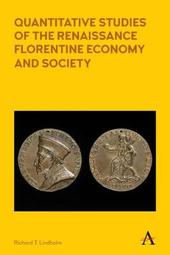
|
Quantitative Studies of the Renaissance Florentine Economy and Society
Paperback / softback
Main Details
| Title |
Quantitative Studies of the Renaissance Florentine Economy and Society
|
| Authors and Contributors |
By (author) Richard T. Lindholm
|
| Series | Anthem Other Canon Economics |
|---|
| Series part Volume No. |
1
|
| Physical Properties |
| Format:Paperback / softback | | Pages:350 | | Dimensions(mm): Height 229,Width 152 |
|
| ISBN/Barcode |
9781785271267
|
| Classifications | Dewey:330.945511 |
|---|
| Audience | | Professional & Vocational | |
|---|
|
Publishing Details |
| Publisher |
Anthem Press
|
| Imprint |
Anthem Press
|
| Publication Date |
31 August 2019 |
| Publication Country |
United Kingdom
|
Description
Quantitative Studies of the Renaissance Florentine Economy and Society is a collection of nine quantitative studies probing aspects of Renaissance Florentine economy and society. The collection, organized by topic, source material and analysis methods, discusses risk and return, specifically the population's responses to the plague and also the measurement of interest rates. The work analyzes the population's wealth distribution, the impact of taxes and subsidies on art and architecture, the level of neighborhood segregation and the accumulation of wealth. Additionally, this study assesses the competitiveness of Florentine markets and the level of monopoly power, the nature of women's work and the impact of business risk on the organization of industrial production.
Author Biography
Richard T. Lindholm received a doctorate in history and in economics from the University of Chicago. He taught in the Department of Finance, Lundquist College of Business, University of Oregon.
Reviews"Lindholm's Quantitative Studies illuminates the underlying dynamics of plague mortality, residential patterns, home ownership, wealth distribution and women's work in the wool industry in Renaissance Florence. Drawing on economic theory and advanced statistical methods, yet attentive to microhistorical contexts, this important book opens up new pathways for future research." -Julius Kirshner, Professor Emeritus of Medieval and Renaissance History, University of Chicago, USA
|